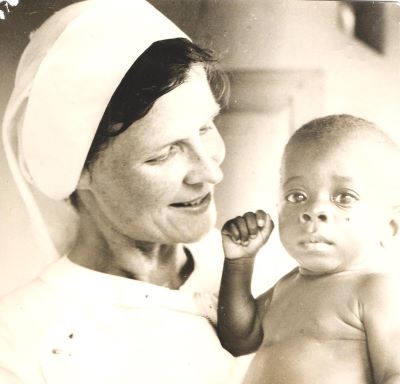Quick Community Action on Cholera
Inter-connectedness
by Sr. Celine Jones and Sr. Cecily Bourdillion MMM Ireland 27.03.2022
 Hippocrates, in 400 BC, described a diarrhoeal disease which could have been Cholera. Since antiquity cholera was known to exist in the Ganges Valley, India. Pandemics in the 19th century resulted in its spread to the rest of India and then in southeast and central Asia, the Middle East and in East Africa. Until 1970 it had not appeared in Nigeria.
Hippocrates, in 400 BC, described a diarrhoeal disease which could have been Cholera. Since antiquity cholera was known to exist in the Ganges Valley, India. Pandemics in the 19th century resulted in its spread to the rest of India and then in southeast and central Asia, the Middle East and in East Africa. Until 1970 it had not appeared in Nigeria.
In 1970, we were members of the MMM community that administered Eleta Hospital on the outskirts of Ibadan, western Nigeria. Ibadan was the largest and one of the most populous cities of Nigeria. One evening when the community gathered in the sitting room after supper, Sr. Leonie, the Medical Officer in Charge, said she was really concerned about the cases of severe diarrhoea and vomiting she was seeing, presenting with severe dehydration. Could it be cholera?
It was cholera and it rapidly spread across the city and further. Cholera thrives when contaminated water and food infected by dirty hands enter the mouths of human beings. The number of patients coming to the hospital with diarrhoea and vomiting rapidly rose. Some died on the way or soon after arrival. Quick thinking, organised planning and prompt action was necessary to save lives and give hope to people overwhelmed by the epidemic.
Bishop Finn SMA called a meeting of the two Catholic Hospitals, Our Lady of Apostles, Oke Offa and MMM Hospital Eleta, to discuss what response we could make as the Government Hospitals refused to admit patients with Cholera. Oke Offa agreed to take over all the patients in Eleta Hospital thus freeing Eleta Hospital to treat only patients with Cholera. An SMA priest was returning to his home in Holland the next day and on the return of that flight came Cholera vaccine for all sisters, staff and patients.
Fr. O’Hay SMA and Ojo, our carpenter, went into the market and bought all the timber available to make the “Cholera beds.” These were planks on legs with a hole in the centre under which was placed a deep basin for the diarrhoea and beside which was a basin for the vomitus. Each patient was placed on a bed with a member of family to care for him/ her. The intravenous (IV) infusion, replacing the fluids and electrolytes lost in the vomiting and diarrhoea, was crucial in the saving of life. This IV infusion was started on arrival and the Cholera vaccine was given. We were blessed with the presence of Sr. Majella, our pharmacist, who set up the apparatus for the production of these IV solutions and the oral rehydration solution. Vital signs were taken and had to be continued. The carer had the responsibility of minding the IV infusion and calling for help when the bottle was nearly empty so that it could be quickly replaced with more. The carers set a high standard of compassionate and dedicated care of their patients.
The 250 patients admitted each day filled the hospital. The epidemic reached its peak in February 1971 and ended mid-May of that year. There were only three doctors in Eleta Hospital and the nursing sisters were taught to set up the IV infusions and became skilled. In particular, Sr. Jacinta was there for the small veins of the babies.
The patients kept coming and each patient required much care. More hands were needed. They appeared in response to the dire need – priests, seminarians, Sisters, Brothers, secondary school students, friends and neighbours. At night doctors came from University College Hospital (UCH) to assist the three overworked doctors of Eleta. Day and night continued care was needed.
Mike and Roger were two young members of Voluntary Services Overseas from England. They were teaching in the University. Every evening around 5 pm they came to Eleta and stayed until 5 am. Their essential work was to dig as many latrine pits as possible into which the carers emptied the buckets of diarrhoea and vomitus.
A good supply of water was essential. The water supply at Eleta Hospital had always been a serious problem. For the whole period of the Cholera epidemic the Water Board supplied five tankers of water every single day! Indeed, help came from so many generous people. The Lebanese community offered their help and our driver, Andrew, went every day to collect the delicious food they prepared to feed all the workers.
4303 patients with Cholera were treated within an 8-week period. That was 1503 male, 1991 female and 809 children. There were amazingly few deaths – around 300. It was reported that the low death rate in Eleta was due to the availability of the necessary IV infusions and the dedicated care provided.
Daily Mass was our prayer for the day leaving all our patients, carers and workers in God’s loving hands.
Once the patients were strong enough to stand, they were transferred to another ward to make way for the more serious patients arriving. It was the prompt action, the dedicated care of staff, the co-operation and generosity of so many volunteers and the available fluids for treatment that saved the lives of many and planted the SEED OF HOPE in a desperate situation. The felt privileged to be a part of this community action.
SEE ALL BLOG POSTS
